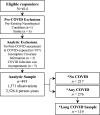This is a preprint.
ASSESSMENT AND CHARACTERIZATION OF COVID-19 RELATED COGNITIVE DECLINE: RESULTS FROM A NATURAL EXPERIMENT
- PMID: 37986906
- PMCID: PMC10659478
- DOI: 10.1101/2023.11.06.23298101
ASSESSMENT AND CHARACTERIZATION OF COVID-19 RELATED COGNITIVE DECLINE: RESULTS FROM A NATURAL EXPERIMENT
Update in
-
Characterization of Change in Cognition Before and After COVID-19 Infection in Essential Workers at Midlife.Am J Med Open. 2024 Aug 13;12:100076. doi: 10.1016/j.ajmo.2024.100076. eCollection 2024 Dec. Am J Med Open. 2024. PMID: 39498311 Free PMC article.
Abstract
Background: Cognitive impairment is the most common and disabling manifestation of post-acute sequelae of SARS-CoV-2. There is an urgent need for the application of more stringent methods for evaluating cognitive outcomes in research studies.
Objective: To determine whether cognitive decline emerges with the onset of COVID-19 and whether it is more pronounced in patients with Post-Acute Sequelae of SARS-CoV-2 or severe COVID-19.
Methods: This longitudinal cohort study compared the cognitive performance of 276 patients with COVID-19 to that of 217 controls across four neuroinflammation or vascular disease-sensitive domains of cognition using data collected both before and after the pandemic starting in 2015.
Results: The mean age of the COVID-19 group was 56.04±6.6 years, while that of the control group was 58.1±7.3 years. Longitudinal models indicated a significant decline in cognitive throughput ((β=-0.168, P=.001) following COVID-19, after adjustment for pre-COVID-19 functioning, demographics, and medical factors. The effect sizes were large; the observed changes in throughput were equivalent to 10.6 years of normal aging and a 59.8% increase in the burden of mild cognitive impairment. Cognitive decline worsened with coronavirus disease 2019 severity and was concentrated in participants reporting post-acute sequelae of SARS-CoV-2.
Conclusion: COVID-19 was most likely associated with the observed cognitive decline, which was worse among patients with PASC or severe COVID-19. Monitoring patients with post-acute sequelae of SARS-CoV-2 for declines in the domains of processing speed and visual working memory and determining the long-term prognosis of this decline are therefore warranted.
Keywords: Coronavirus disease 2019 (COVID-19); Covid-19 related Cognitive Decline (CRCD); executive dysfunction; post-acute sequelae of SARS-CoV-2 (PASC); severe acute respiratory syndrome coronavirus 2 (SARS-COV-2).
Figures


References
-
- Gonzalez-Fernandez E, Huang J. Cognitive Aspects of COVID-19. Current Neurology and Neuroscience Reports 2023; 23: 531–8. - PubMed
Publication types
Grants and funding
LinkOut - more resources
Full Text Sources
Miscellaneous
